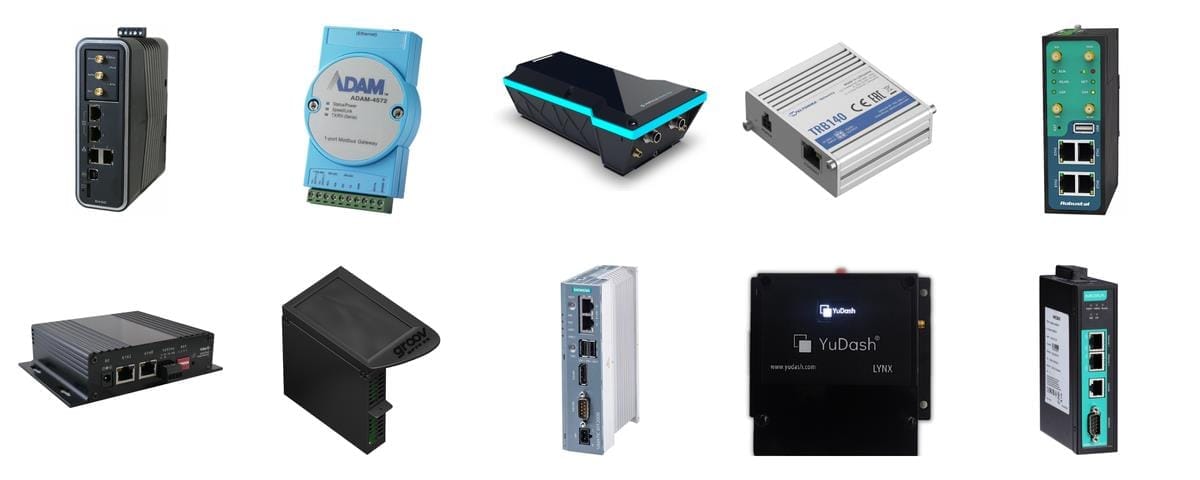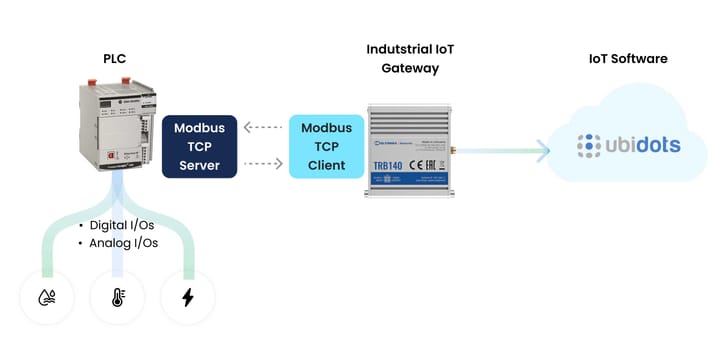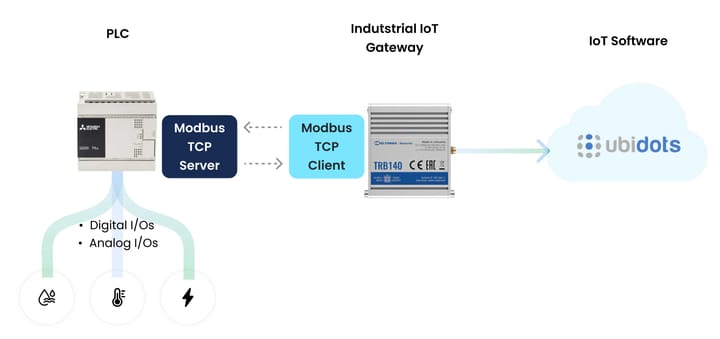Industrial IoT & Edge IoT Gateways: 10+ Best Models for 2025 (+Protocol & Price Table)
Compare rugged IIoT, cellular-LTE and edge-AI gateways side-by-side (Moxa, Advantech, Siemens…). Specs, Prices & FAQs updated 2025.

The Internet of Things (IoT) revolutionizes industries by connecting physical devices to the digital world, enabling real-time data exchange and automation. In industrial settings, this connectivity transforms operations by providing actionable insights from machinery and processes. However, the sheer diversity of industrial equipment, each with its own communication protocols, presents a significant challenge in achieving seamless integration.
This is where industrial IoT gateways come into play. Acting as intermediaries, these gateways bridge the gap between legacy systems and modern cloud platforms. They translate data from various protocols, like Modbus, into cloud-friendly protocols, like HTTP or MQTT. Modbus, a widely-used protocol in industrial automation, ensures that data from devices such as sensors, controllers, and machines can be effectively communicated across different systems. Paired with MQTT, a lightweight messaging protocol designed for low-bandwidth, high-latency networks, these gateways enable secure and reliable data transfer to the cloud, making it possible for industries to harness the full potential of IoT.
See the Quick Comparison Table below for a side-by-side view of specs.

By leveraging IoT gateways compatible with protocols like Modbus and MQTT, industries can seamlessly integrate their existing equipment with advanced cloud services that allow them to closely monitor their operations, trigger custom actions based on machine data, leverage powerful data analytics, and much more. This connectivity paves the way for increased machine uptime, predictive maintenance, and optimized operations, making IoT gateways one of the pillars for digital transformation.
Quick Comparison Table (Specs & Prices)
| # | Model | Capacity (CPU / RAM) | Operating System(s) | Industrial Protocols | Connectivity | Edge Features | Ruggedness (IP) | Certifications | Price Range (USD) | Our take – pros / cons |
|---|---|---|---|---|---|---|---|---|---|---|
| 1 | Red Lion FlexEdge DA50D | ARM Cortex-A8 1 GHz / 512 MB | Crimson 3.x (Linux) | Modbus, OPC UA, MQTT, DNP3 | Ethernet, Cellular | Modular I/O, built-in PLC | — | UL C1D2, ATEX | 900 – 1200 | + Modular, multi-protocol – Pricey, no Wi-Fi |
| 2 | Advantech ADAM-6717 | Cortex-A8 1 GHz / 512 MB | Linux + Node-RED | Modbus TCP/RTU, OPC UA, MQTT | Ethernet | Node-RED flows, C API | — | CE, UL | 450 – 500 | + Low cost, Node-RED OOTB – No cellular |
| 3 | Particle Monitor One | nRF52840 @ 64 MHz / 256 KB | Particle Device OS | Modbus, CAN | Cellular | OTA updates, GNSS | IP67 | FCC, CE | 299 – 399 | + Battery-ready, outdoor – No Ethernet |
| 4 | Sixfab ALPON X4 | Cortex-A72 @ 1.5GHz / 1–8 GB RAM | Debian, Raspberry Pi OS | Modbus TCP/RTU supported via GPIO/USB, EtherNet/IP (EIP), OPC UA, DNP3 | Ethernet, Cellular, Wi-Fi | Docker, Node-RED, GNSS, Bluetooth, OTA updates, Web UI | IP40 | CE, FCC, IC, UKCA, RoHS, WEEE, REACH | $350–$550 | + Strong specs/price – Limited cellular connectivity |
| 5 | Teltonika TRB140 | Cortex-A7 1.2 GHz / 128 MB | RutOS (OpenWrt) | Modbus, MQTT, SNMP | Ethernet, Cellular | Docker containers | IP30 | CE, RoHS | 160 – 200 | + Tiny, inexpensive – Single-port, IP30 |
| 6 | Robustel R3000 | ARM 400 MHz / 128 MB | RobustOS (Linux) | Modbus, OPC UA, MQTT | Ethernet, Cellular, Wi-Fi | Edge2Cloud SDK, VPN | IP30 | CE, FCC | 350 – 450 | + Dual-SIM, VPN suite – Older CPU |
| 7 | Amplified Eng. Fatbox G3 | ARM-based / 256 MB | OpenWrt / Linux | Modbus TCP, CAN, MQTT | Ethernet, Cellular, Wi-Fi | CAN, ZigBee, BT | IP30 | RCM, CE | 600 – 700 | + Multi-bus I/O – Sparse docs |
| 8 | Opto 22 GRV-EPIC-PR2 | Quad-core / 3.75 GB | Linux + Ignition Edge | Modbus, OPC UA, MQTT, EIP | Ethernet | Ignition Edge, Node-RED | IP20 | UL, CE, ATEX | 2200 – 2400 | + High compute, HMI – Large, costly |
| 9 | YuDash LYNX IoT Gateway | - | - | Modbus RTU (RS-485), Modbus TCP, OPC UA | 4G/LTE, Ethernet, Wi-Fi | IData scaling and post processing | IP30 | - | - | + Flexibility – Sparse docs |
| 10 | Siemens SIMATIC IOT2050 | TI AM65xx A53 / 1–2 GB | Siemens Industrial OS / Debian | Modbus, OPC UA, MQTT, PROFINET | Ethernet (Wi-Fi/Cell via mPCIe) | Docker, Node-RED, Arduino slot | IP20 | CE, UL | 400 – 500 | + Big ecosystem, expandable – Needs add-ons for wireless |
What to Look for in an Industrial IoT Gateway
When selecting an industrial IoT gateway, there are several important factors to consider to ensure seamless operation, scalability, and integration with your existing and future infrastructure. Below are five characteristics to look for when evaluating your options:
| What to look for | Description |
|---|---|
| 1- Supported industrial protocols |
Ensure the gateway supports widely used protocols such as Modbus (RTU & TCP), OPC UA, and DNP3. This guarantees compatibility with existing equipment and smooth device-to-device communication. |
| 2- Remote management |
Prefer gateways that include remote maintenance via VPN or a vendor portal. This lets you provision devices, push code, and perform updates without on-site visits. |
| 3- Edge computing capabilities | Local processing and analytics cut latency and bandwidth costs—vital when scaling to thousands of devices and high data volumes. |
| 4- Cellular backhaul | Built-in 4G/LTE (or similar) provides a resilient fallback network, keeping operations running in remote or mobile deployments. |
These characteristics are relevant for choosing an IoT gateway that fits your specific operational requirements, enabling long-term growth, scalability, and seamless integration into your industrial infrastructure.
Based on our experience at Ubidots, made up of years of hand-on tests and the testimonies of hundreds of clients, we decided to make a list with the ten Modbus-compatible industrial IoT gateways that we think can have the biggest impact on different industrial operations.
Top 10+ Modbus-Compatible Industrial IoT Gateways for 2025
1- Red Lion FlexEdge DA50D

The Red Lion FlexEdge DA50D is a versatile and adaptable industrial IoT gateway designed to keep pace with rapidly evolving communication standards. Its modular design allows for easy upgrades, making it a future-proof solution for various industrial environments. Whether used as a networking gateway, protocol converter, or automation controller, the DA50D offers significant flexibility to meet diverse operational needs. The device’s field-upgradable software ensures it can adapt to changing network requirements, providing long-term value.
Powered by the Crimson® software, the DA50D enables seamless connectivity across your system, regardless of the brand of PLC or other equipment. Its advanced features include an embedded OPC UA server and client, real-time data logging with cryptographic support, and an intuitive diagnostic light ring for at-a-glance system status. The gateway also offers robust security features such as a stateful firewall, VPN connections, and RADIUS authentication. With its rugged design and certifications for operation in hazardous environments, the FlexEdge DA50D is built to deliver reliable performance in even the harshest industrial settings.
2- Advantech ADAM-6717

The Advantech ADAM-6717 is an all-in-one intelligent gateway designed to seamlessly integrate data acquisition, edge computing, and gateway functionalities into a single device. It features 8 analog inputs, 5 digital inputs, and 4 digital outputs, making it ideal for a variety of industrial monitoring and control applications. Its built-in Node-RED interface allows for intuitive, flow-based graphical programming, enabling rapid application development and deployment at the edge.
The ADAM-6717 features a high degree of flexibility thanks to its support of Modbus TCP and Modbus RTU protocols, ensuring smooth integration with various industrial devices. Furthermore, it’s ability to easily connect to cloud platforms through protocols such as MQTT makes it a great choice for a wide range of Industrial IoT applications. It also has built-in support for cloud and database access, as well as edge data analysis and logic control, making the ADAM-6717 a provider of robust capabilities for real-time data management. Additionally, data can be stored on a micro SD card, ensuring data retention and flexibility. With an operating temperature range of -40 ~ 70°C, the ADAM-6717 is built to withstand the demands of industrial environments while providing dependable, long-term performance.
3- Particle Monitor One

The Particle Monitor One is a robust and versatile IoT gateway designed to provide reliable asset tracking and management in challenging environments. With dynamic cellular connectivity options, including LTE CAT 1 and LTE CAT M1, as well as BLE support, this gateway ensures continuous and dependable communication with your assets. Its IP67-rated ruggedized enclosure makes it suitable for both indoor and outdoor use, capable of withstanding harsh conditions while delivering consistent performance. The Monitor One’s location tracking is enhanced by location fusion technology, which combines Wi-Fi, GNSS, and cellular data to offer precise location information, even in hard-to-reach areas.
Adaptability and power efficiency are key strengths of the Monitor One. It seamlessly integrates with most industrial equipment and sensors, offering out-of-the-box support for common machine protocols like Modbus, RS-232, and CAN. This, and its ability to easily connect to the cloud, makes it a versatile choice for various industrial applications. The device is also reprogrammable, allowing for over-the-air updates to add new features, address security vulnerabilities, and modify product behavior. With advanced power management that supports both rechargeable and single-use batteries, as well as solar charging capabilities, the Monitor One is designed for long-lasting operation in remote or off-grid locations. Additionally, it offers white label options, enabling businesses to customize the product’s appearance to align with their brand.
4- ALPON X4 Edge Computer

The ALPON X4 is a powerful and compact industrial edge gateway designed for demanding IoT deployments in automation, monitoring, and edge AI applications. Built around the Raspberry Pi CM4, the ALPON X4 delivers high-performance computing with up to 8GB of RAM and 32GB of eMMC flash storage, all within a rugged, fanless aluminum chassis capable of operating in harsh environments. Its diverse connectivity options—Gigabit Ethernet, dual-band Wi-Fi, LTE with eSIM support, and optional PoE—make it highly adaptable for remote and mobile use cases. The inclusion of GPIO expansion and support for DIN rail or wall mounting further enhances its industrial versatility. With compatibility for Modbus and MQTT, and documentation covering PLC integration and SCADA use, the ALPON X4 stands out as a flexible bridge between legacy systems and modern cloud services.
Beyond hardware, the ALPON X4 is tightly integrated with ALPON Cloud, a remote device management platform that supports real-time monitoring, remote updates, and bulk provisioning. This allows operators to scale deployments efficiently while maintaining visibility and control over distributed assets. With built-in TPM 2.0 and secure encrypted communications, the device also meets modern cybersecurity standards. The ALPON X4 is ideal for use cases where low-latency edge processing and reliable cloud connectivity converge. Whether you're enabling predictive maintenance, aggregating sensor data, or deploying smart automation in the field, the ALPON X4 offers the performance, flexibility, and scalability required for industrial IoT success.
5- Teltonika TRB Series

Teltonika TRB is a series of cellular IoT gateways designed for advanced industrial solutions. Here we reviewed the Teltonika TRB140, a compact, energy-efficient IoT gateway designed for mission-critical applications that require reliable connectivity and robust security features. Despite its small size, the TRB140 offers powerful LTE Cat 4 and Gigabit Ethernet connectivity, making it suitable for a wide range of industrial applications. The device supports key industrial communication protocols like DNP3 and Modbus, ensuring seamless integration with existing systems. Its compatibility with over 20 network protocols, including MQTT, HTTP, and TCP, further enhances its versatility, allowing it to meet the diverse needs of industrial IoT deployments.
Security and remote management are standout features of the TRB140. It includes advanced security measures such as pre-shared keys, digital and X.509 certificates, and IP login attempt blocking. The device also supports Teltonika Networks' Remote Management System, enabling easy monitoring, configuration, and firmware updates from a centralized location. The TRB140’s robust firewall capabilities, combined with remote management via WebUI or CLI, provide comprehensive control over network security. Additionally, the gateway supports a wide range of data-to-server protocols, including HTTP(S) and MQTT, making it ideal for securely transmitting data to cloud services like Azure and AWS Kinesis. With its high degree of customization available in a Linux environment, the TRB140 is a flexible and secure solution for industrial IoT needs.
6- Robustel R3000 Industrial LTE Router

The Robustel R3000 Industrial LTE Router is a versatile and rugged VPN gateway designed to provide reliable and secure wireless connectivity in harsh environments. With dual SIM support and multiple WAN options, including WWAN1, WWAN2, Ethernet WAN, and WLAN WAN, the R3000 ensures uninterrupted connectivity through its advanced link backup and load balancing features. This makes it an ideal choice for mission-critical M2M/IoT applications where constant uptime is essential. The router's support for IPv6 and a wide range of VPN protocols, including IPsec, OpenVPN, GRE, and L2TP, enhances its security and versatility, making it a robust solution for complex industrial networks.
One of the standout features of the R3000 is its Edge2Cloud functionality, which enables seamless connection of industrial devices like Modbus, OPC UA, and Siemens S7 to the cloud with minimal edge software effort. This capability is integrated into Robustel's custom operating system, RobustOS, which also supports an SDK and app environment for further customization. The router’s industrial-grade design, capable of operating in temperatures ranging from -40 to +75 °C, along with its flexible mounting options, ensures reliable performance in challenging conditions. Remote management is made easy through multiple interfaces, including Web, CLI, SMS, and SNMP, providing comprehensive control and monitoring capabilities for industrial IoT deployments.
7- Amplified Engineering Fatbox G3 Edge IoT Gateway

The Amplified Engineering Fatbox G3 EDGE IoT Gateway is a certified industrial gateway designed to seamlessly integrate and manage data from a variety of industrial devices, including those using Modbus, CAN Bus, Serial, and Ethernet protocols. With its versatile interface options, including a switchable RS232/RS485 port, dual LAN Ethernet ports, and support for USB OTG connectivity, the FATBOX G3 provides robust connectivity for a wide range of industrial applications. It also offers an optional CAN Bus interface, making it suitable for both heavy and road vehicles through J1939 and OBD2 ISO15765 protocols.
This gateway is built for demanding environments, featuring a rugged aluminum enclosure and an industrial-rated operating temperature range of -40°C to 75°C. It’s designed for flexible deployment, with options for DIN rail mounting. The FATBOX G3 excels in data aggregation, combining inputs from Modbus TCP/RTU, Serial RS485/232, CAN Bus, ZigBee, and Bluetooth 4 devices. These capabilities are further enhanced by its integration with Ubidots and MQTT cloud clients, enabling efficient cloud management via Wi-Fi or Ethernet connections. The gateway’s support for custom edge programming allows users to tailor its functionality to specific use cases, making it a powerful tool for industrial IoT applications.
8- Opto 22 GRV-EPIC-PR2

The Opto 22 GRV-EPIC-PR2 is a versatile and powerful Edge Programmable Industrial Controller designed to meet the demands of modern industrial IoT (IIoT) applications. This embedded Linux-based controller combines control, connectivity, data handling, and visualization within a single, compact unit. Its gateway functions make it ideal for integrating edge computing into your network, allowing real-time processing and decision-making directly at the source of your data. The GRV-EPIC-PR2 features a high-resolution, resistive-touch LCD display that simplifies I/O and network configuration, troubleshooting, and system monitoring, providing an intuitive interface for managing your operations.
Security is a key focus of the GRV-EPIC-PR2, with robust features designed to protect your network and data. It includes two independent Ethernet interfaces, which allow you to segment trusted and untrusted networks, and a built-in configurable firewall for additional protection. User authentication is enforced, with no default usernames or passwords, and the device supports both local and LDAP-managed accounts. Data encryption and security certificate management further enhance its security profile. Additionally, the GRV-EPIC-PR2 supports Node-RED, a popular flow-based development tool, allowing you to create custom logic flows for data exchange between equipment and online services without extensive coding. With an operating temperature range of -20 °C to +70 °C, this controller is built to withstand challenging industrial environments while delivering reliable performance.
9- YuDash LYNX IoT Gateway

The YuDash LYNX IoT Gateway is a versatile and powerful solution designed for seamless cloud connectivity and data logging across a wide range of industrial and environmental instruments. With support for multiple industrial protocols, including Modbus RS485, MODBUS TCP/IP, and I2C sensors, the LYNX gateway can act as a Modbus master, reading up to 96 parameters across 16 Modbus slaves. It also supports four analog channels, making it a highly adaptable tool for various industrial applications. The gateway offers robust network connectivity options, including 4G/LTE, Ethernet, and Wi-Fi, ensuring reliable communication with IoT platforms via MQTT, HTTP, and FTP protocols. The inbuilt JSON payload format library and custom payload generator engine allow for easy integration with any IoT platform, making the LYNX gateway a flexible choice for diverse deployment scenarios.
Configuration and deployment are simplified with the LYNX gateway's user-friendly features. It can be easily configured through a web browser on a laptop or mobile phone, and its on-device OLED display provides real-time status updates and fault detection, streamlining deployment and debugging processes. The gateway also includes advanced features like input data scaling, two-way communication through Modbus-write, and configurable looping cycles, making it adaptable to various use cases. Additionally, the LYNX gateway supports low-power operation with deep-sleep modes and offers a network failure handler that enables local storage and back-filling of data in case of connectivity issues. With JSON-based configuration backup and restoration, the LYNX gateway is well-suited for mass deployments, offering a scalable and cost-effective solution for industrial IoT applications.
10- Siemens SIMATIC IOT2050

The Siemens SIMATIC IOT2050 is a highly adaptable industrial IoT gateway designed to meet the demands of modern industrial environments. Powered by ARM processor technology from Texas Instruments, this gateway offers a robust platform for implementing a wide range of IoT, gateway, and edge computing applications. With options for dual-core or quad-core Cortex A53 processors, the SIMATIC IOT2050 provides the processing power necessary for complex tasks while maintaining low power consumption, making it suitable for continuous 24/7 operation. The gateway's real-time clock (RTC) ensures accurate timekeeping even in the event of a power loss, and its use of DDR4 memory technology with up to 2 GB of RAM supports smooth and efficient operation.
One of the standout features of the SIMATIC IOT2050 is its high connectivity and expandability. The gateway includes an ARDUINO slot for connecting IOs and sensors, a miniPCI Express slot for integrating wireless applications, and multiple interfaces such as dual Ethernet ports, USB ports, and a switchable serial interface (RS-232/485/422) for connecting intelligent sensors. This wide range of connectivity options makes the SIMATIC IOT2050 a versatile tool for integrating into various industrial networks, environments, and platforms. Additionally, the gateway supports free programming in high-level languages and offers access to a broad range of Linux-based packages, providing users with the flexibility to tailor the gateway to their specific application needs. With its industrial-grade design and comprehensive feature set, the SIMATIC IOT2050 is a powerful solution for enabling smart industrial IoT applications.
11- Moxa MGate 5105-MB-EIP

The Moxa MGate 5105-MB-EIP is a robust industrial Ethernet gateway designed to facilitate communication between Modbus RTU/ASCII/TCP and EtherNet/IP networks, making it an ideal solution for IIoT applications. With support for the MQTT protocol, the MGate 5105-MB-EIP enables seamless integration with third-party cloud services, providing advanced security and configuration options for remote monitoring applications such as energy and asset management. This flexibility allows businesses to scale and extend their IoT infrastructure efficiently, leveraging cloud-based solutions to monitor and manage critical operations.
One of the key features of the MGate 5105-MB-EIP is its user-friendly web console, which simplifies configuration and monitoring without the need for additional software. Administrators can easily log in to access all settings, while general users can view data with read-only permissions. The web console offers comprehensive tools for monitoring I/O data, including I/O Data Mapping, which displays data addresses for both protocols within the gateway’s memory, and I/O Data View, which tracks data values for online nodes. Additionally, the gateway’s diagnostics and communication analysis tools provide valuable insights for troubleshooting, ensuring reliable and efficient operation in industrial environments.
12- Elastel EG324 IoT Gateway

The Elastel EG324 IoT Gateway is a high-performance, Arm-based industrial gateway designed for reliable data acquisition and communication in demanding environments. Equipped with a quad-core Cortex-A9 1.4 GHz CPU, 512MB DDR3 RAM, and 8GB eMMC storage, this gateway offers a powerful computing platform suitable for edge computing applications. Its rugged industrial-grade design ensures stable operation across extreme temperatures ranging from -40°C to 85°C, with protection against electromagnetic interference and lightning surges. The compact fanless metal housing, with DIN-rail and wall mounting options, makes it easy to deploy in various industrial settings.
Connectivity is a key strength of the EG324, featuring four isolated RS485/RS232 serial ports, dual auto-sensing Ethernet ports, and an mPCIe slot for 4G LTE, 3G, 2G, NB-IoT, or Cat M1 cellular networks. The gateway supports multiple protocols, including Modbus RTU/TCP, OPC UA, BACnet, and MQTT, making it highly adaptable for industrial automation and remote monitoring. Running on an optimized Ubuntu Core 20.04 OS, the EG324 is pre-configured with tools like Node-RED and Docker, allowing for flexible customization and seamless cloud integration. With its reliable connectivity, broad protocol support, and robust design, the Elastel EG324 is a versatile solution for industrial IoT applications requiring efficient data handling and edge computing capabilities.
Wrapping Up
In conclusion, as the industrial landscape continues to evolve, choosing the right IoT gateway is crucial for ensuring seamless integration, reliable connectivity, and efficient data management. Modbus and MQTT, as key protocols, play a significant role in bridging legacy systems with modern cloud-based platforms, enabling industries to harness the full potential of their operations. The ten Modbus-compatible industrial IoT gateways highlighted in this guide represent some of the best options available, each offering unique features and capabilities tailored to different industrial needs.
When selecting a gateway, it's essential to consider factors such as connectivity, data processing capabilities, scalability, and security to ensure that the chosen solution aligns with your current and future requirements. The right gateway not only facilitates smooth communication between devices but also supports advanced features like remote management and simple cloud communication, which are critical for optimizing industrial processes. By carefully evaluating these characteristics, companies can make informed decisions that will enhance their operational efficiency.


